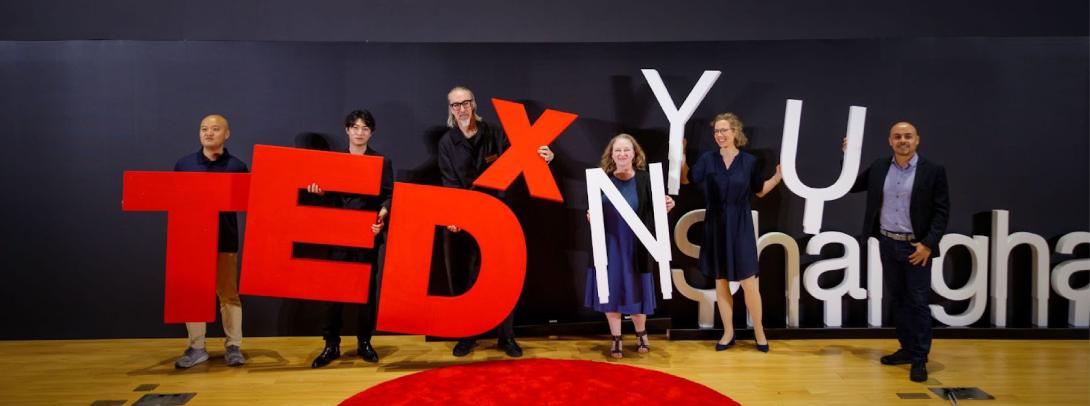NYU Shanghai’s student-led TEDxNYUShanghai club hosted its 8th annual conference on April 19, bringing nine inspirational guests on stage in the form of six TED talks and one panel discussion. The speakers, from a wide range of fields, shared talks on the theme of “emergence,” illustrating how coming together through small actions and united voices can prepare us to face tomorrow’s challenges.
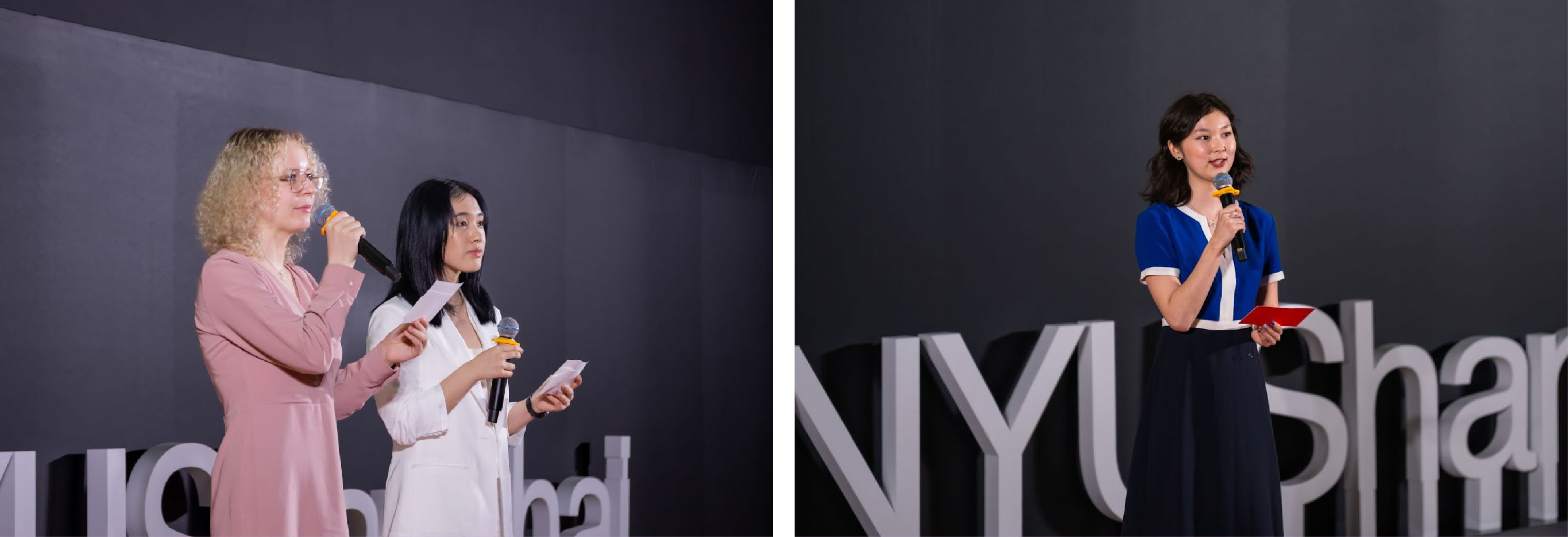
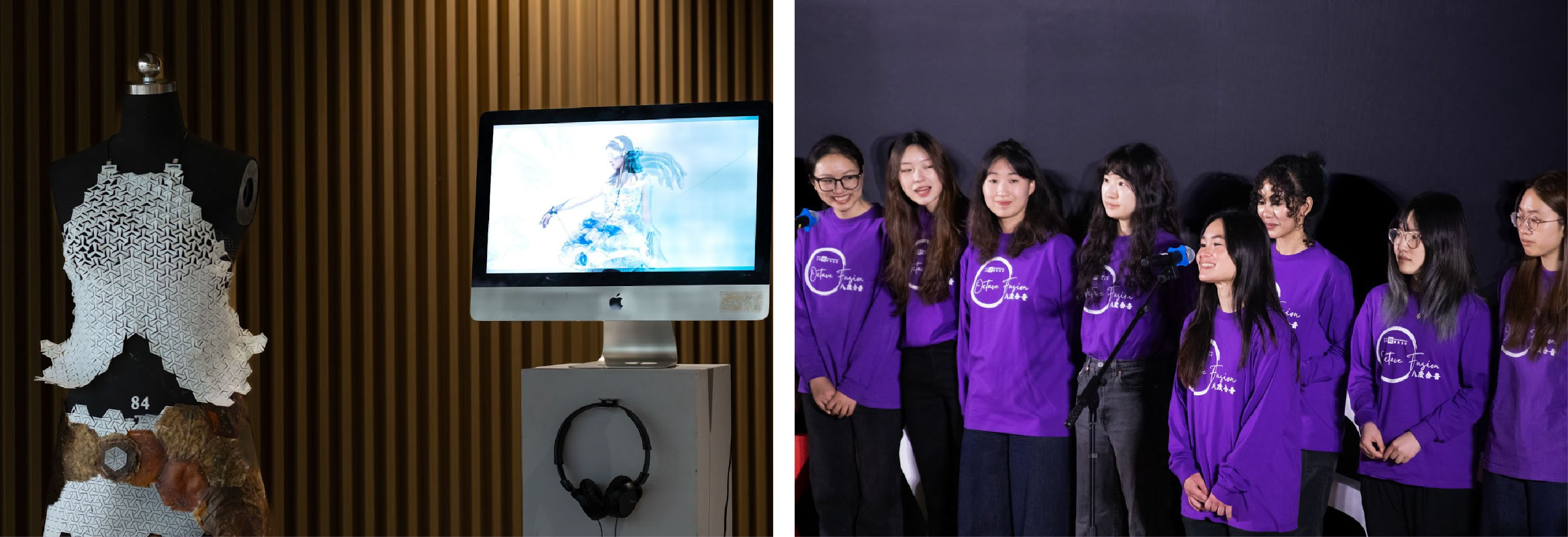
A panel discussion, moderated by Rohan Desai ’27, invited Dr. Antonio Benítez García, Xiao Yang, Wu Qi, and Leon Junliang Huang to share their personal journeys of navigating cross-cultural life, switching careers, and rethinking what legacy means today. From entrepreneurship and law to content creation and diplomacy, their career paths showed how meaningful work is often found at the crossroads of tradition and change. Their message was clear: stay open, stay grounded, and boldly shape your own story.
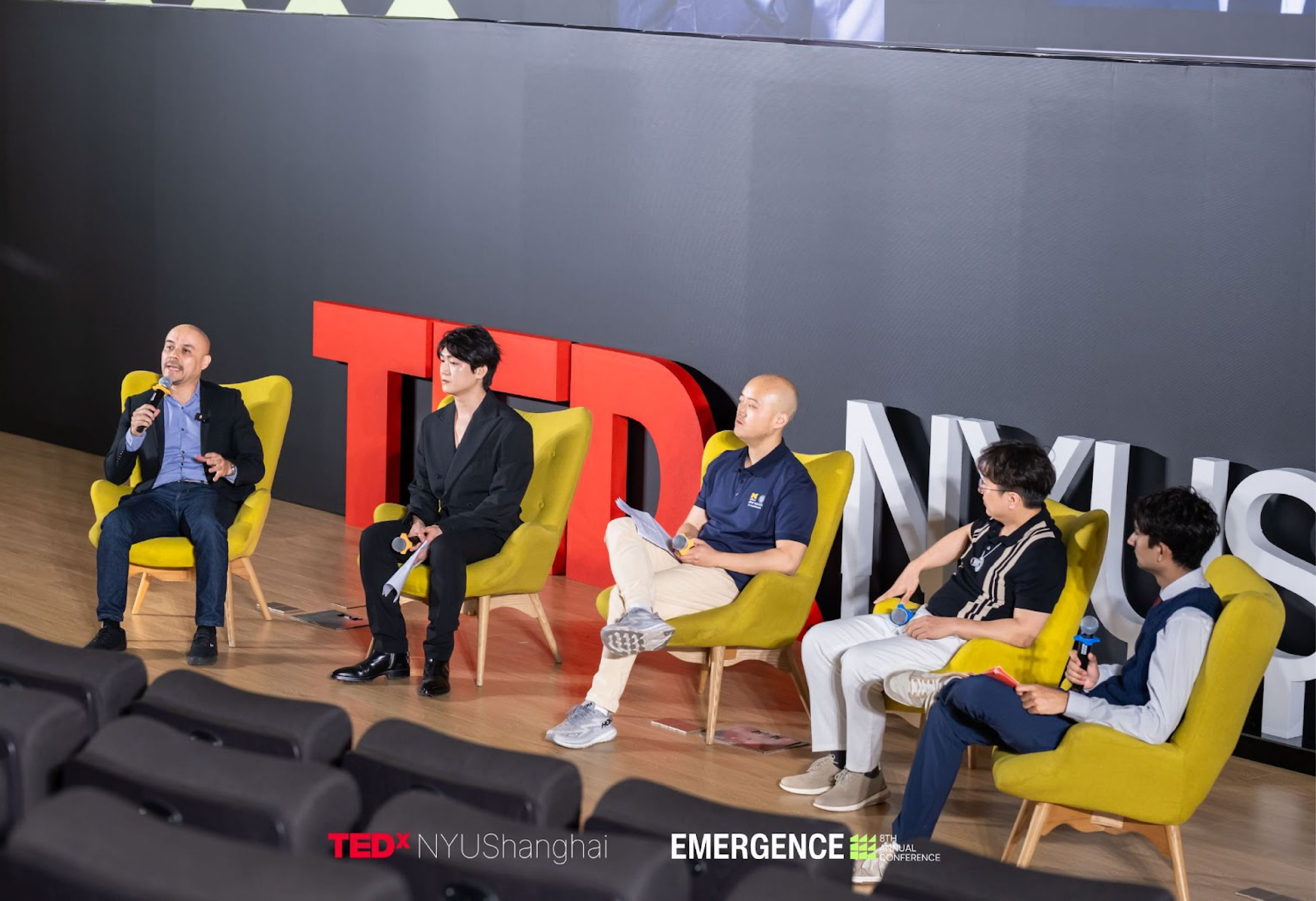
Tan Yuanyuan: Dancing to Who I Am
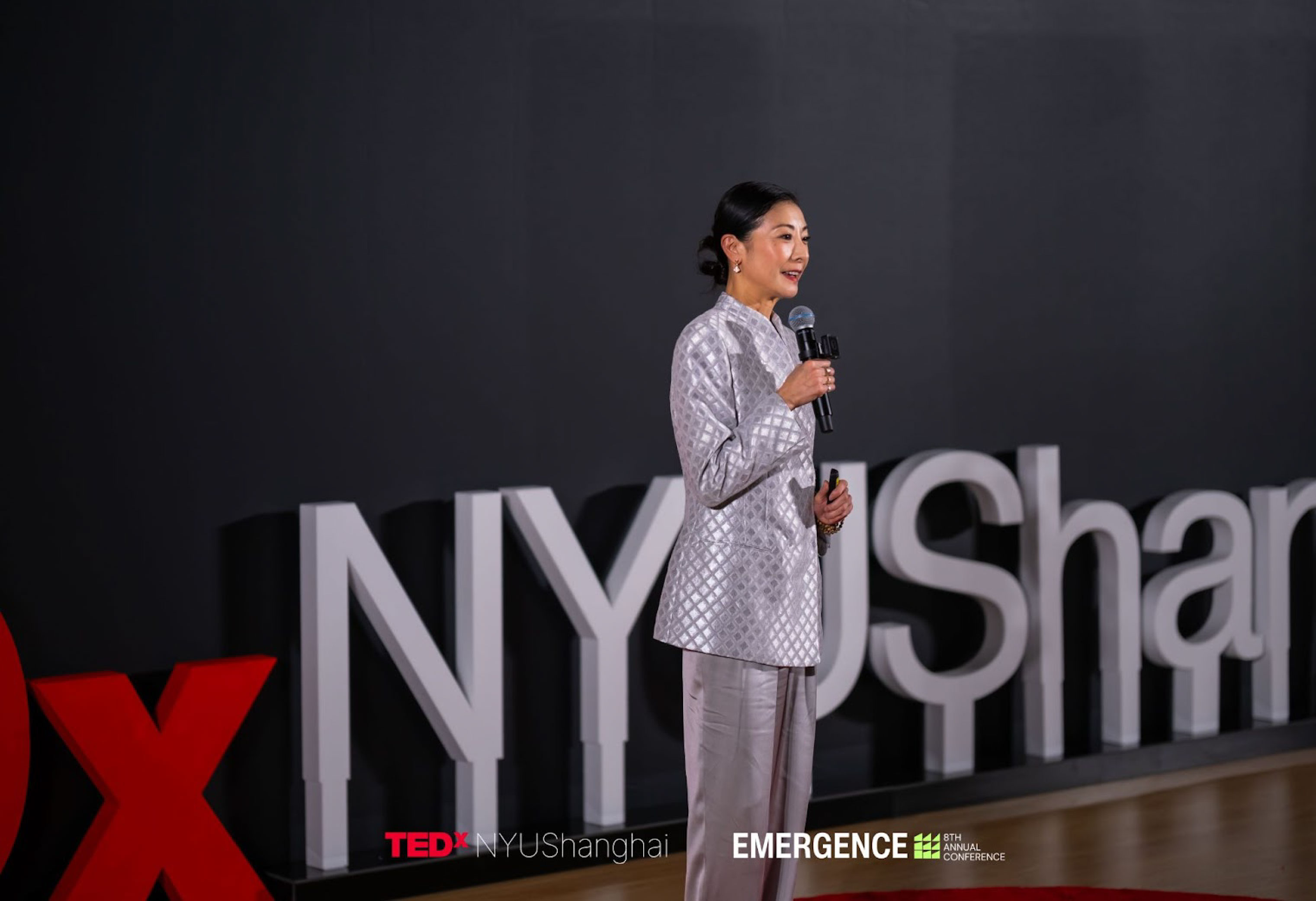
“Start by refusing to see walls at all,” Tan Yuanyuan told the audience, inviting them to close their eyes as she delved into her experiences starting out as a late-blooming ballet student and emerging an international gold-medalist, principal dancer at San Francisco Ballet, and most recently as a professor and artistic director at Suzhou Ballet.
“I began my journey a year later than most—but a coin flip, a leap of faith, and plenty of sweat carried me from the edge of the stage to its center,” Tan said, reflecting on how her perseverance led her to high achievements—from winning gold at the 1992 International Ballet Competition in Paris to taking a gold medal and Nijinsky Award in Nagoya, Japan. Soon after, she joined San Francisco Ballet as the company’s first Chinese principal dancer.
Her ballet career put her on center stage—being named “Asia’s Hero” by Time Magazine in 2004 and being honored by San Francisco with her own day—April 9th became “Yuan Yuan Tan Day.”
Tan pushed through injuries and even delayed surgery to maintain her performance career. She endured brutal rehearsals for The Little Mermaid but pushing through allowed her to realize her own resilience and passion. “Through broken pointe shoes and delayed surgeries, I learned that every struggle teaches you not just a choreography, but who you are,” she said.
After 29 years with SF Ballet, Tan became a professor at Shanghai Theatre Academy as well as the artistic director of Suzhou Ballet Company. “I left one stage and found rebirth on another, trading spotlight for mentorship, and solos for the joy of guiding young dancers,” she said.
Tan says this current stage of her career offers a new kind of fulfillment as she mentors young dancers and co-creates shows like White Snake. “Art never dies,” she said. “It lives on through every performance, every movement, every gesture—and through every dancer who dares to begin again.”
Theresa Hudzinski: Creating Space to Become the Leader You Need
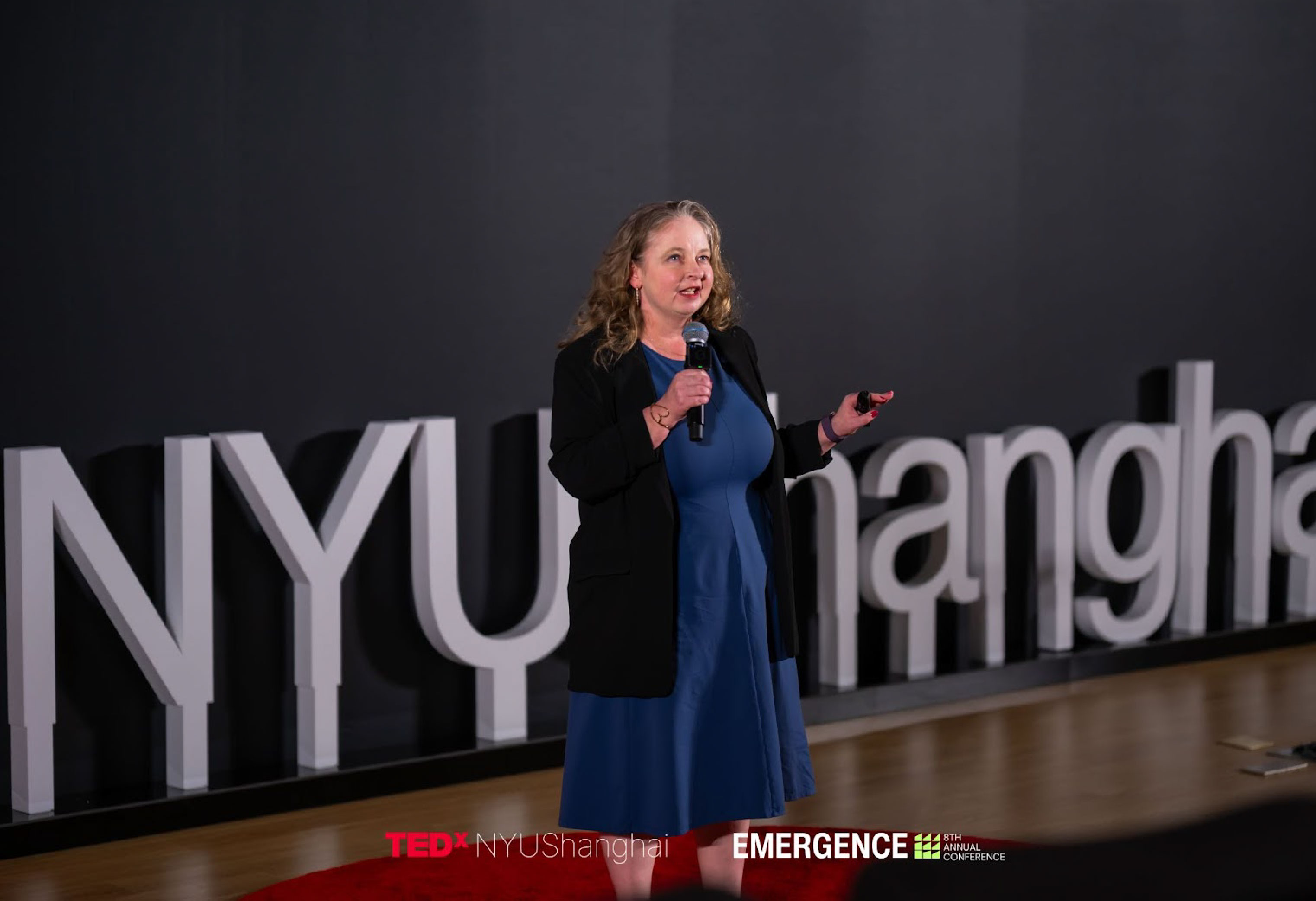
Leadership coach and former Disney executive Theresa Hudzinski asked participants to ruminate on the last time they felt anxiety around their colleagues. “Recall a moment when you felt unsafe at work.” And then she flipped the question on them: “How would you feel if you discovered you were the reason someone else felt that way?”
For Hudzinski, true leadership is about “adding vulnerability, authenticity, empathy, and presence” and creating an inclusive space structured around psychological safety. Citing a 2025 Gallup poll of over 50 countries, she noted that employees value leaders who demonstrate trust, hope, stability, and compassion. “These are not buzzwords. They’re the currency of leadership, and we can’t go half‑way on delivering them,” she said.
Throughout her extensive career with Disney, Hudzinksi stood by her values. “Connection is the energy between people when they feel seen, heard, and valued,” she said. “That’s where true leadership begins.” Moving up from theme park support roles to resort hotels and international openings in Hong Kong and Shanghai, Hudzinski said it’s been fundamental throughout every step of her career that every team member she’s worked with has felt seen, heard, and valued.
“Leadership is not a title—it’s a commitment to every person we serve,” she said. “Trust isn’t earned through heroic deeds but through paying attention, listening, and gestures of genuine care in the smallest moments.”
Wallace Chan: The Spoon That Shaped My World
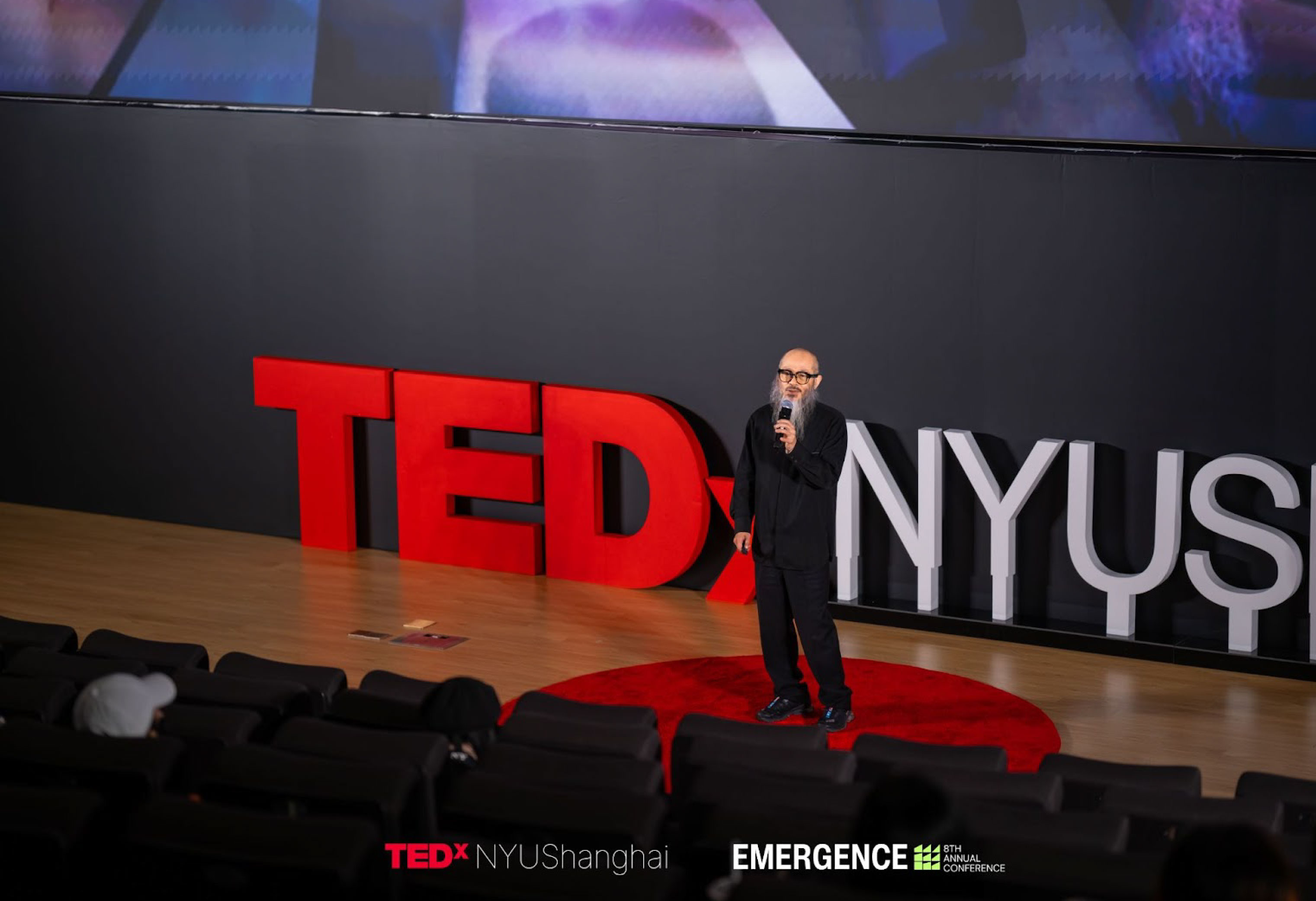
Renowned Chinese jewelry creator Wallace Chan shared a life-defining moment he had at age five—the day he broke a porcelain spoon. Growing up so poor that he and his siblings shared a single plastic spoon at dinnertime, Chan recalls observing the adults in his family using a delicate porcelain spoon and was convinced that it was magical.
Until it shattered, when he dropped it. “In its broken pieces, I saw a window to a new world,” he said. That new world was later forged when Chan created “Wallace Chan Porcelain,” a reinforced material that’s unbreakable.
“Porcelain looks soft and white, almost like light—but it survives fire and rises anew, like a phoenix from the ashes,” said Chan who spent eight years studying porcelain’s history and chemistry as he developed a multi-fire carving process that fused porcelain with titanium armatures and gemstones. “I studied seventeen ingredients, measured their melting points, and sized them to fuse in harmony—crafting porcelain five times stronger than steel,” he said.
“I had nothing—and from that nothing emerged everything,” Chan reflected. “Failure is part of the firing. It burns away everything but what truly matters.”
Katie Aafjes-Van Doorn: Transforming Mental Health Care into a Computational Science
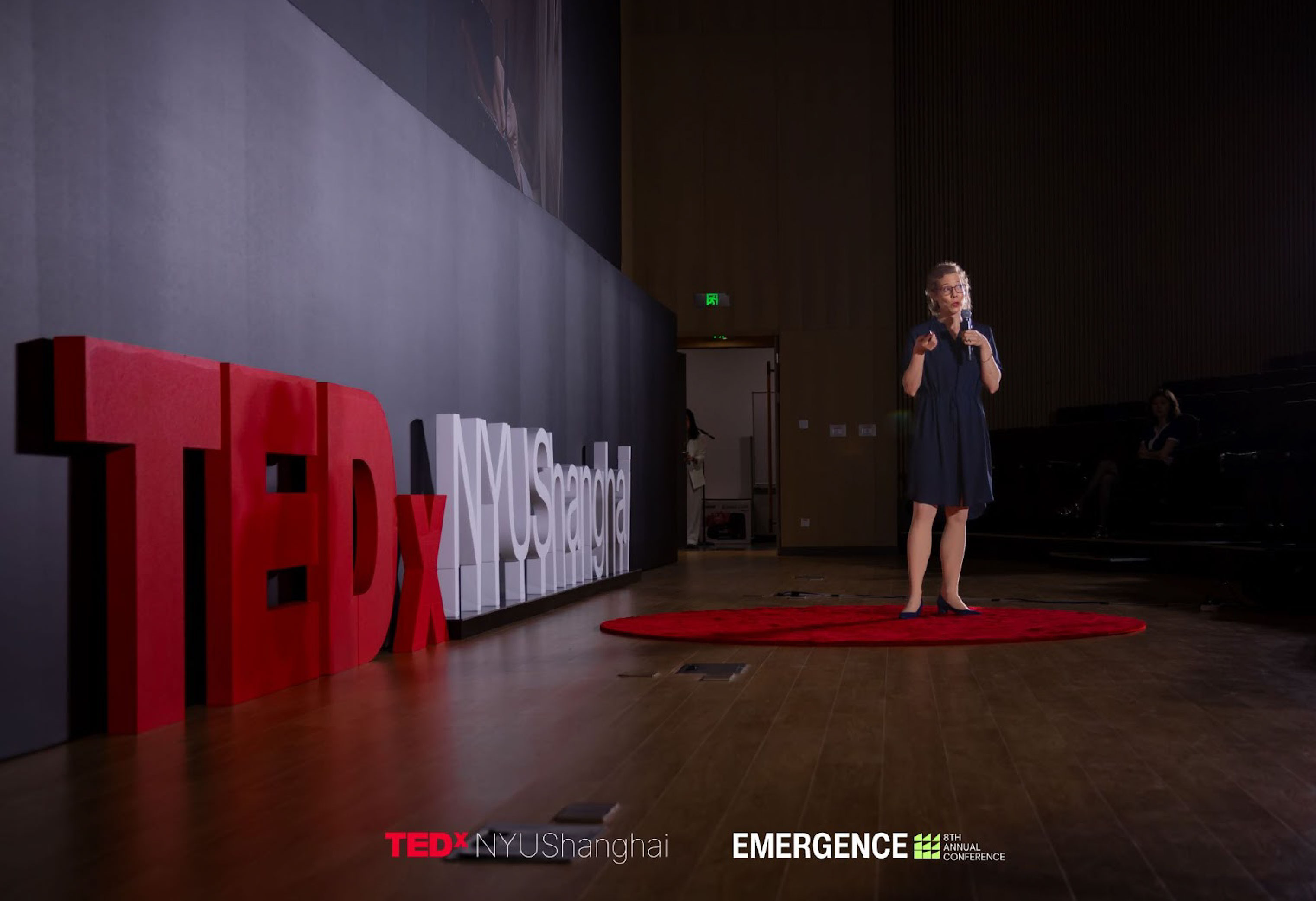
Clinical Psychologist and NYU Shanghai Associate Professor Dr. Katie Aafjes‑van Doorn shared how computational science can help create more accurate, data-based ways to assess mental health. She explained that our reliance on self-reported questionnaires may slow down diagnosis and leave patients stuck in a frustrating cycle of trial and error.
“We lack objective biomarkers in mental health—so we ask people, ‘How have you been feeling?’ when their very condition impairs self‑awareness,” she said. “Fifteen minutes and one questionnaire later, you’re diagnosed—and set on a trial‑and‑error path that could take months, with side effects along the way.”
Dr. Aafjes-van Doorn shared that nearly 40% of people with bipolar disorder are first misdiagnosed with depression. Some groups, like older adults, men, and teens, are often under-diagnosed. She also explained that trying different treatments takes time and doesn’t always work right away—many patients deal with side effects like weight gain or try several medications or therapies before feeling better.
Aafjes-van Doorn says sporadic mental health questionnaires are inaccurate, failing to reflect the hourly fluctuations of mental health. “Imagine measuring cancer based on how ‘cancerous’ someone felt last week instead of using an X‑ray or blood test,” she said.
But what would an AI-driven solution look like? Aafjes‑van Doorn’s startup, Deliberate AI, has created a tool to measure the severity of a patient’s depression and anxiety. “Our FDA‑accepted AI tool infers depression severity as accurately—and more reliably—than human clinicians,” she says. They’re also testing AI chat tools and prediction models in large healthcare systems.
Deliberate AI uses digital sensors, multimodal AI architectures, and generative models (Aafjes-van Doorn calls them “the ‘three musketeers’) that can finally make mental health a true computational science.” She explained how it all works. Smartphones and wearables continually collect data on a patient’s speech, facial expressions, sleep, and heart rate. AI then combines all this information to find stronger mental health indications than any one measure alone, and generative AI creates more data, runs automatic check-ins, and offers support right when it’s needed.
“No more clipboards. No more guessing. Just objective, personalized insights that let clinicians focus on what they do best: helping people,” she said. “By rethinking how we measure mental health, we can shift from reactive care to proactive, precision‑driven treatment—and stay ahead of relapse before it even strikes.”
Niklas Olsson: The Choice
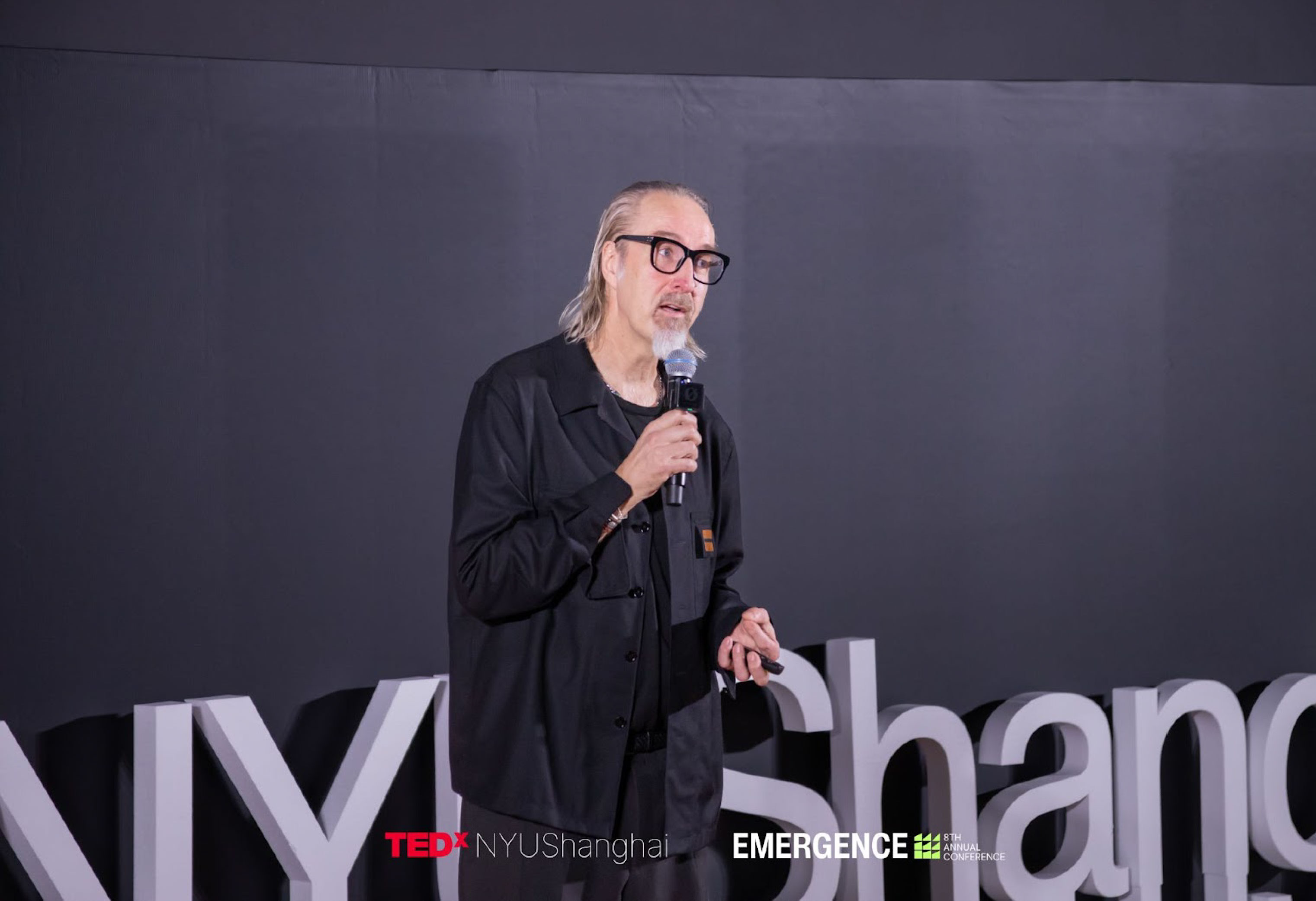
“We are not what we do; we are what we choose to be.” Hearing those words, said Niklas Olsson, the Learning & Organization Development Director for Asia Pacific for the Zegna Group inspired him to explore how organizations, teams, and individuals come into being and emerge through their choices.
“One of the most important choices in life is the people you spend your time with,” said Olsson. “They shape you more than parents or teachers ever could.” He mentioned three of his friends whose mentorship he credits for shaping his lifelong passion for fiction, his confidence in math, and even his ability to surf and communicate smoothly in English.
From the company we keep to the coffee we drink, Olsson says our choices define us and reflect our values. He demonstrated the “five‑whys” iterative interrogative technique, showing how by continually asking ourselves ‘why’ we can peel back the layers of our motivation to reveal what our deepest values are—going from ‘I want this job for stability’ to ‘I value peace of mind and love.’
Olsson’s advice to leaders? Cultivate awareness so that teams and organizations can adapt and transform, rather than react to events. “To shape the emergencies of our time—whether AI, pandemics, or supply‑chain disruptions—we must first understand the consequences of our choices,” he said.
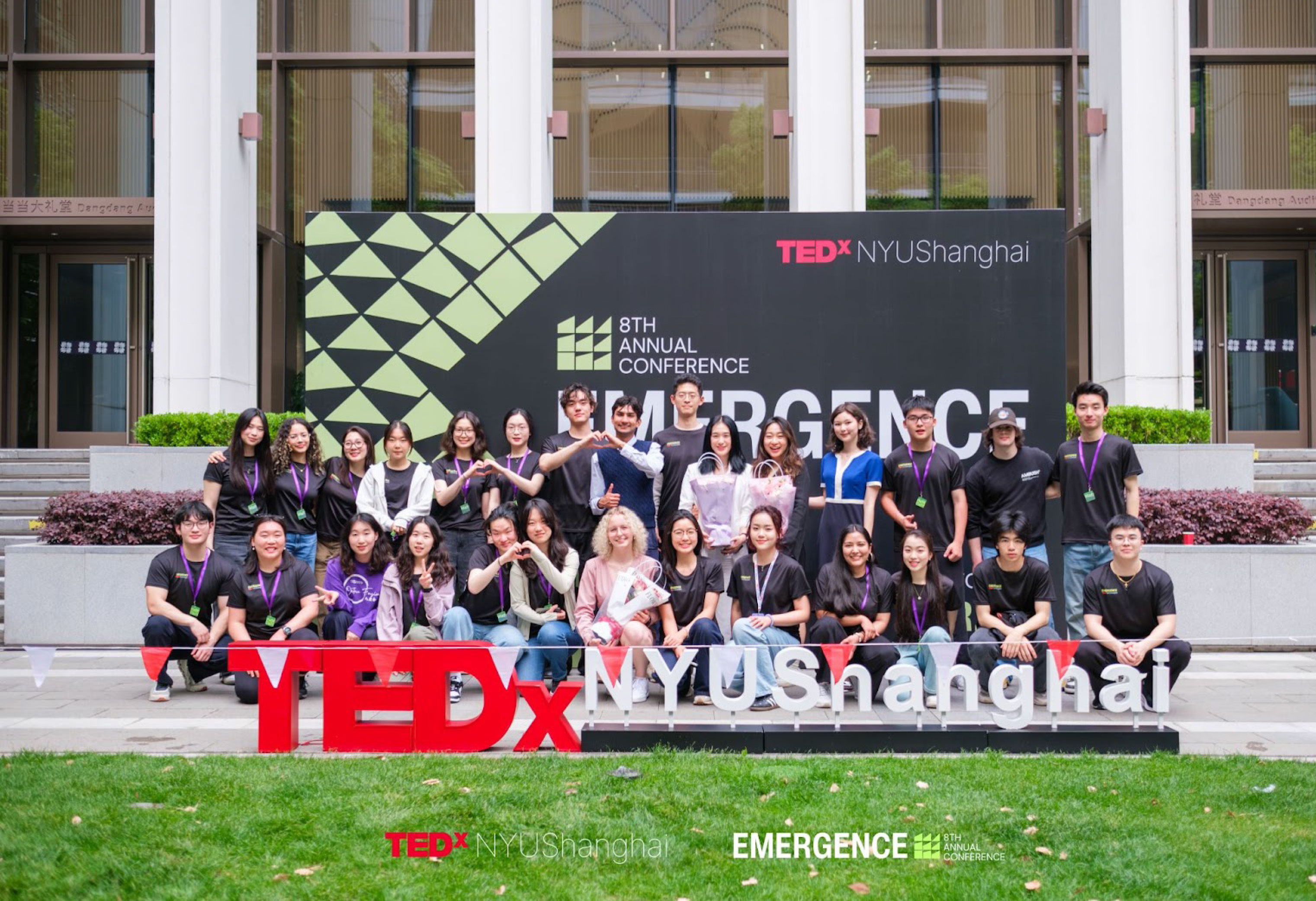
This year’s TEDxNYUShanghai conference was organized by:
Core Curating Team:
Noelia Yang – President
Margaret Czarnik – Vice President
Adriana Zhou – Finance Director
Rohan Desai – Activity Director
Esther Feng – Activity Assistant Director
Cassandra Yang – Speakers’ Affairs Director
Yerkezhan Zhunusova – Associate Director of Speakers’ Affairs
Skye Xi – Marketing Director
Members:
Jeddy King Duran – Finance Member
Ethan Lee – Finance Member
Grace Zhang Hu – Finance Member
Hongyi (Jacob) Zhang – Finance Member
Mittali Rungta – Activity Member
Wenlan (Adeline) Gu – Activity Member
Hannia Colon Valdez – Activity Member
Canyu (Felicia) Zhang – Activity Member
Yingyi (David) Xia – Activity Member
Wanning (Sophie) Zhao – Speakers’ Affairs Member
Chengyuan (Ewan) Peng – Speakers’ Affairs Member
Wanxin (Diana) Liu – Speakers’ Affairs Member
Qixin (David) Zhu – Speakers’ Affairs Member
Mia Jean Knepel – Speakers’ Affairs Member
Ina Lee – Speakers’ Affairs Member
Shiwen (Zoe) Zhu – Marketing Member
Linda He – Marketing Member
Danial Sagimbayev – Marketing Member
Tsengelmurun (Murun) Enkh-Onon – Marketing Member
Weiyu (William) Zheng – Marketing Member
Maral-Od (Marla) Norov – Marketing Member
Special Thanks
Henry Frazier – Equipment Support


